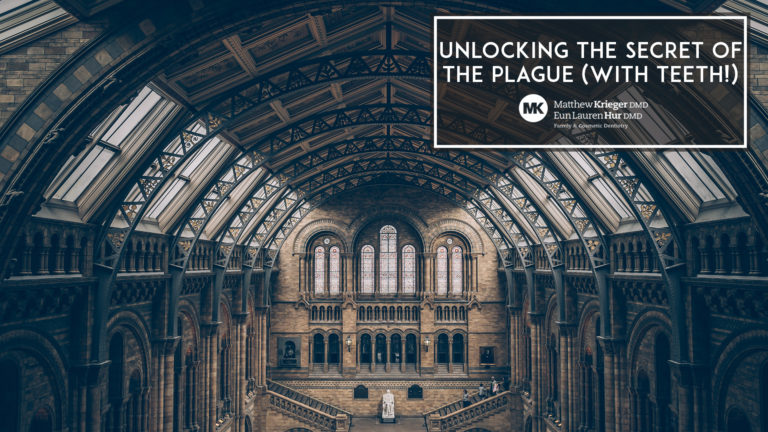Your teeth contain a myriad of secrets, many of which your dentist can tell just by glancing in your mouth. Being honest with your doctor is a prerequisite for receiving safe, adequate care — whether you’re a pack-a-day smoker who’s concerned about tooth discoloration or you have a sweet tooth that’s contributing to decay, your dentist knows what you get up to in your free time, even if you claim the contrary. Rather than trying to pull a fast one on your dental professional to spare yourself a lecture, be upfront about habits and concerns that could impact your treatment. Your dentist already knows these five things just by looking at your teeth.
Another coping mechanism that’s not so great for your teeth? Biting your nails. Your dentist knows you do it — it creates chipping and wear on your teeth. The teeth you use to chew can look worn down and flattened. It’s not the nails that cause this wear but rather the tooth-on-tooth rubbing that occurs as you gnaw. Your dentist can help suggest alternative coping mechanisms to satisfy the urge to chew and can help repair any damage caused by the habit.
Additionally, pregnant women may develop a benign growth called a pyogenic granuloma or “pregnancy tumor.” This growth is perfectly harmless and disappears once your pregnancy is over, but it’s still a dead giveaway that you’re expecting. Your dentist needs to know about the baby on board to ensure safe and adequate care while you’re in the office, especially if you’re getting X-rays to facilitate your treatment. Be candid with your dentist and hygienist — they won’t tell anyone the news.
Additionally, eating disorders like bulimia and anorexia can lead to dry mouth. A lack of adequate fluid intake can facilitate the development of dry mouth, but so can a lack of chewing — your salivary glands are activated when you chew. Dry mouth makes it more likely that acid erosion will cause damage and can contribute to the proliferation of bacteria that cause decay.
More than just impacting your dental care, your struggle with an eating disorder needs to be addressed — and knowing you have the nonjudgmental support and care of your dental team can make it easier to reach out and seek help.
The first signs of oral cancer are changes within the mouth, including red, white or speckled patches, unexplained bleeding, a change in the way your teeth sit in your mouth, and lumps, bumps, areas of erosion or changes in the typical appearance of your teeth, gums and lips. You might notice these things if they’re up front in the areas you typically see when you brush, but if the cancer has started further back in your mouth, you’re less likely to take notice of the signs.
Your dentist, if they suspect the beginnings of oral cancer, will refer you to an oral surgeon for a biopsy to get to the bottom of what’s going on.
If you book an appointment for a root canal and your dentist asks you to bend over, don’t assume you’re the victim of an office prank — when you bend over, the pressure on your sinuses increases. If you feel worse, you may not have a dental emergency at all but full sinuses. Since the roots of your upper teeth rest against the sinus cavity, a clog in the works can lead to excruciating pain that might send you to the dental chair unnecessarily.
1. You Have Nervous Habits Like Chewing Your Nails or Sucking Your Thumb
Sucking your thumb as a child is a typical experience for many, but some continue the self-soothing habit long past infancy. Sucking your thumb when nervous or upset — past the age of 7 or 8 — can cause lasting changes in the way your teeth are positioned in your mouth. Those who suck their thumbs or did so into preteen years often find that their front teeth protrude outward more than usual. Be honest with your dentist about this habit — orthodontic treatments to fix the alignment of your teeth can easily remedy this issue, and most cases are mild enough that Invisalign treatments are viable.Another coping mechanism that’s not so great for your teeth? Biting your nails. Your dentist knows you do it — it creates chipping and wear on your teeth. The teeth you use to chew can look worn down and flattened. It’s not the nails that cause this wear but rather the tooth-on-tooth rubbing that occurs as you gnaw. Your dentist can help suggest alternative coping mechanisms to satisfy the urge to chew and can help repair any damage caused by the habit.
2. You’re Pregnant
If you’ve started trying to expand your family but were waiting to tell anyone the joyous news, you’re out of luck at the dentist’s office. During pregnancy, your mouth undergoes changes due to increased blood flow and hormonal shifts. Not only does the increased blood flow mean that your gums may appear more prominent or inflamed, but nearly half of all pregnant women develop gingivitis during their gestational period. This is thanks to an increase in the hormone progesterone, which can nurture the bacteria in your mouth and contribute to gum issues or even increased tooth decay.Additionally, pregnant women may develop a benign growth called a pyogenic granuloma or “pregnancy tumor.” This growth is perfectly harmless and disappears once your pregnancy is over, but it’s still a dead giveaway that you’re expecting. Your dentist needs to know about the baby on board to ensure safe and adequate care while you’re in the office, especially if you’re getting X-rays to facilitate your treatment. Be candid with your dentist and hygienist — they won’t tell anyone the news.
3. You’re Struggling with an Eating Disorder
Even if no one else in your life spots the signs of an eating disorder, your dentist knows. Purging your meals causes damage nearly exclusively to the back of your teeth because of stomach acid eroding the enamel there. Acid erosion can lead to decay and increased cavities, all of which need to be treated by your dentist.Additionally, eating disorders like bulimia and anorexia can lead to dry mouth. A lack of adequate fluid intake can facilitate the development of dry mouth, but so can a lack of chewing — your salivary glands are activated when you chew. Dry mouth makes it more likely that acid erosion will cause damage and can contribute to the proliferation of bacteria that cause decay.
More than just impacting your dental care, your struggle with an eating disorder needs to be addressed — and knowing you have the nonjudgmental support and care of your dental team can make it easier to reach out and seek help.
4. You Have Oral Cancer
You might not know about this scary, potentially life-threatening change in your mouth, but your dentist is often the first line of defense in detecting oral cancer — and you might need to send them a thank-you card for catching the disease early for treatment.The first signs of oral cancer are changes within the mouth, including red, white or speckled patches, unexplained bleeding, a change in the way your teeth sit in your mouth, and lumps, bumps, areas of erosion or changes in the typical appearance of your teeth, gums and lips. You might notice these things if they’re up front in the areas you typically see when you brush, but if the cancer has started further back in your mouth, you’re less likely to take notice of the signs.
Your dentist, if they suspect the beginnings of oral cancer, will refer you to an oral surgeon for a biopsy to get to the bottom of what’s going on.
5. You Have Sinus Issues
Feel like you need a root canal? Maybe it’s not your teeth at all but a sinus infection. Bad breath? You might be brushing just fine, but your body is having trouble draining your sinuses. Your dentist can tell you’re having issues with upper respiratory infections or allergy season just by examining your mouth. An unpleasant smell — despite having just brushed, flossed and rinsed — can be an indicator that mucus and phlegm have been sitting and incubating bacteria that can lead to infections. A flowery smell might indicate a strep throat infection.If you book an appointment for a root canal and your dentist asks you to bend over, don’t assume you’re the victim of an office prank — when you bend over, the pressure on your sinuses increases. If you feel worse, you may not have a dental emergency at all but full sinuses. Since the roots of your upper teeth rest against the sinus cavity, a clog in the works can lead to excruciating pain that might send you to the dental chair unnecessarily.


